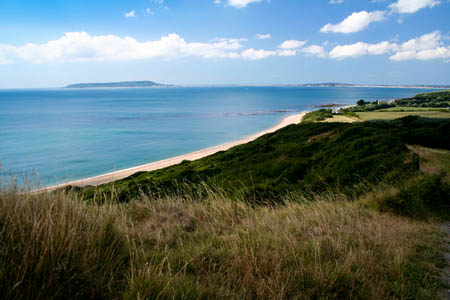The first leg of the England Coast Path will open this summer – and part of it will then be closed for security reasons.
Environment minister Richard Benyon announced the approval of 32km (20 miles) of coastline to be designated under the Marine and Coastal Access Act.
The section in Dorset around Weymouth Bay will, the Department for the Environment, Food and Rural Affairs said, enable walkers to view the Olympic and Paralympic sailing events taking place there as part of the London 2012 Games.
But Defra admitted parts of the coast path will then be closed.
It said: “Two sections of the path in the Weymouth Bay area will be closed from mid-July to mid-September for security reasons but temporary alternative routes will be in place and people will be able to enjoy the rest of the coastal path during the Olympic Games.”
The announcement follows yesterday’s statement by Home Secretary Teresa May that tents will be banned at Olympic venues and police will take action against anyone attempting to sneak camping gear into any events.
Defra said the route, which will start at Rufus Castle in Portland and will end at Lulworth Cove, will improve access to 32km of the British coastline for everyone’s enjoyment, allowing ‘those interested in spotting the Olympic sailing to do so as they make their way along the path’.
Mr Benyon said: “Opening up miles of English coastline like this will allow thousands of people to better enjoy this spectacular coastline and help support local economies by encouraging tourism.
“I want to see more people walking in and accessing our countryside as I know the value such activity has for our health, for our economy and for the spiritual uplift and wellbeing that comes from being out and about in the countryside.
“This will be the first stretch of England’s coastline to be accessed under the new coastal access provisions and it will be ready in time for the 2012 Games so people will have greater opportunities to enjoy the coastline and see the sailing events.”
The Ramblers welcomed the opening of the first section of the England Coast Path and the British Mountaineering Council expressed relief that climbing will continue to be allowed on sea cliffs in the area.
In a statement, it said: “The BMC is particularly relieved that the Secretary of State has made sensible decisions in respect of several objections to the coastal access proposals.
“Specifically the recognition that climbing is a permitted activity under both the new access provisions and in areas of existing open access as defined by the Countryside and Rights of Way Act.
“There was some concern for example, that climbing would be prohibited along the stretch of coast from Durdle Door to Stair Hole but this will not be the case.
“Following discussions between Natural England, the landowner and the BMC, it is envisaged that some voluntary seasonal climbing restrictions will be put in place along this stretch of coast in order to protect some important species of cliff-nesting bird, but these restrictions will be based on the ‘least restrictive approach’ principle.”
It said the Secretary of State considered a number of objections to the coastal access proposals but deemed that the majority of proposals set out in Natural England’s report struck a ‘fair balance’ between private and public rights.
Defra said Natural England has already started work on implementing coastal access in a further five areas: in Cumbria, from Whitehaven to Allonby; in Hartlepool, Durham and Sunderland, from North Bents, Whitburn Bay, to Seaton Carew; in Norfolk, from Weybourne to Sea Palling; in Kent, from Ramsgate to Folkestone and Somerset from Minehead to Brean Down near Weston Super Mare.
However, the BMC echoed the Ramblers’ concerns about the pace of coastal access work.
It said: “The BMC and the Ramblers have campaigned hard for a right of access to the English coast for walkers and climbers and will continue to press on Government the need to continue rolling out our coastal access rights around the whole of the English Coast.
“Since the coalition Government came into power, work has only begun on small stretches of coast in six areas, despite the Marine and Coastal Access Act receiving Royal Assent in 2006.
“In Wales, access to the coast is governed in a different way. The Coastal Access Improvement Programme aims to improve existing rights of way and to develop new routes to establish a continuous Wales Coast Path – this path is set to be launched in May of this year. There is currently no wider coastal margin.
“The BMC is campaigning for a more holistic approach to coastal access in Wales which sees a coastal path with guaranteed views of the sea and a margin of wider open access to match those proposals in England.”
